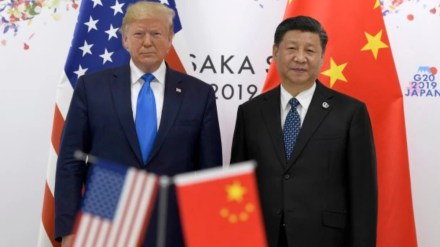US President Donald Trump on Tuesday accused China of “purposefully” refusing to buy soybeans from American farmers, saying this was why the US was considering ending trade with Beijing. Trump described China’s actions as an “economically hostile act” and said the US could produce its own cooking oil instead of depending on China.
“I believe that China purposefully not buying our Soybeans, and causing difficulty for our Soybean Farmers, is an Economically Hostile Act. We are considering terminating business with China having to do with Cooking Oil, and other elements of Trade, as retribution. As an example, we can easily produce Cooking Oil ourselves, we don’t need to purchase it from China,” Trump said on Truth Social.
China cuts back on buying US soybeans
The US President’s remarks came as farmers continue to struggle with low crop prices, while China has been avoiding buying US soybeans. The government promised a relief package to help farmers, but it has been delayed by the ongoing shutdown. Many farmers, however, say they would rather see a trade deal with China than receive aid.
Chinese exports of used cooking oil to the US were already falling before Trump spotlight on the issue in his renewed trade fight with China. After reaching a record 1.27 million tons worth $1.2 billion in 2024, Chinese sales of processed edible oils, including used cooking oil, dropped sharply this year. This happened after China ended tax breaks on exports starting December 1, according to Bloomberg News.
At the same time, China has cut back on buying US soybeans because of Trump’s tough trade policies. Instead, it is buying large amounts of soybeans from Brazil. The US is one of the world’s biggest soybean producers, and Chinese purchases of US soybeans last year were worth around $12.6 billion. This drop in Chinese buying has hurt farmers in Republican-led states, which are an important part of Trump’s political support.
China’s restrictions on rare earth minerals
China’s Ministry of Commerce announced on October 9 that it will ban the export of rare earth materials that could be used by foreign militaries. Gracelin Baskaran, a minerals expert at the Center for Strategic and International Studies, told CNBC that this is the first time China has imposed such limits directly aimed at the defence sector.
Starting November 8, China will place export limits on 12 of the 17 rare earth elements. It will also restrict the export of lithium batteries used in electric vehicles and hard materials used for mining drills. Chinese companies will now need special licenses to sell rare-earth mining or processing equipment overseas.
The biggest change, however, will take effect on December 1. Under the new rule, companies anywhere in the world must get Beijing’s approval before exporting rare-earth magnets or semiconductor materials that contain even 0.1% of metals sourced from China.
The Washington Post, citing experts says these controls suggest that Beijing is pushing for the US to roll back its own export restrictions, not just lower tariffs.
How does it impact US?
The move could hurt the US defense industry, as it depends heavily on these materials. And there is no doubt that it also gives Chinese President Xi Jinping a strong advantage over Trump in their upcoming trade talks.
Rare earth magnets are key parts used in many US military systems, including F-35 fighter jets, Predator drones, Virginia and Columbia class submarines, Tomahawk missiles, radar systems, and smart bombs like the joint direct attack munition series, the Department of Defence has said.
As per the International Energy Agency, China leads the world in rare earth production, controlling 60% of mining and over 90% of refining. And the US Geological Survey says that the US relies on China for about 70% of its rare earth imports.
Could this re-ignite US-China trade war?
The restrictions could spark a fresh wave of tension in the US-China trade relationship after months of relative calm.
Trump has announced that starting November 1, Chinese goods could face 100% tariffs. Combined with the existing 44% tariffs, this could effectively halt trade between the two largest economies, according to Wolfe Research cited by CNBC. Analysts warned that even a small escalation could bring the situation back to the near-embargo levels seen earlier this year.
Trump and Chinese President Xi Jinping are still expected to meet later this month at the Asia-Pacific Economic Cooperation summit in Seoul, according to US Treasury Secretary Scott Bessent. Goldman Sachs suggested that the most likely outcome is a mutual scaling back of aggressive policies, possibly extending the tariff pause agreed upon in May.
